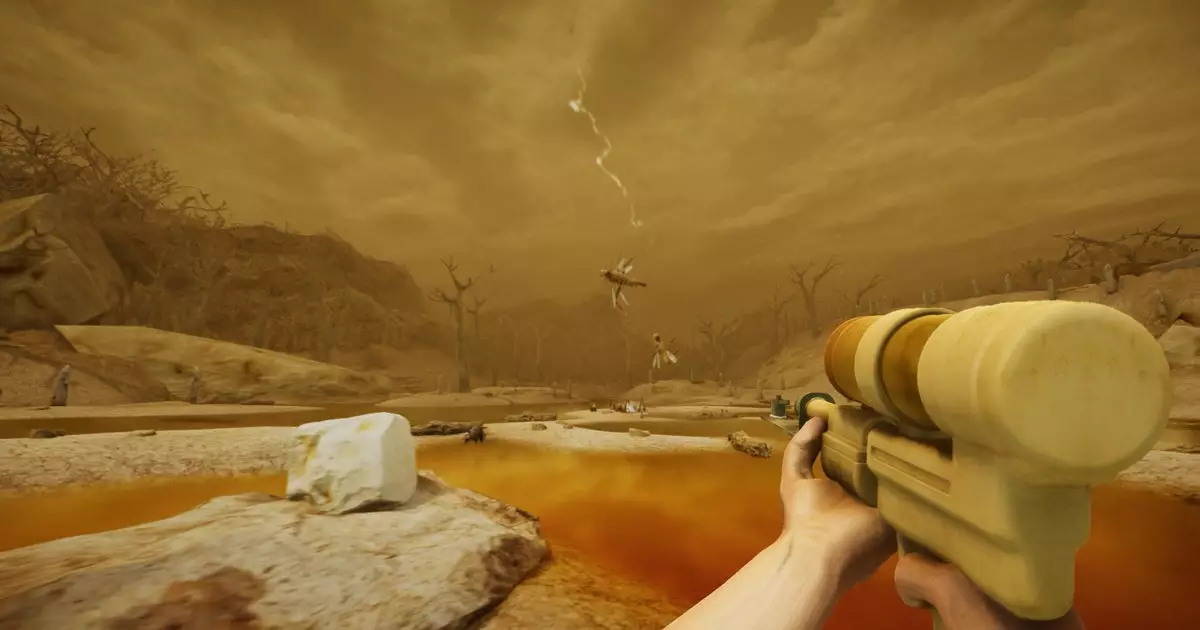In the realm of video games, developers often strive to push the boundaries of creativity, leading to some curious concepts. Among these is “Urge,” an open-world survival shooter that delves into themes of bodily functions—with a focus that many would consider both bizarre and off-putting. While the idea may initially provoke laughter or disgust, a deeper examination reveals a complex layer of design and social commentary that is painfully relevant to contemporary issues.
“Urge” begins with an intriguing narrative foundation: players awaken in a post-apocalyptic landscape, emerging from a surprising car crash. This setting serves as the backdrop for a twisted exploration of survival governed by a substance humorously dubbed “piss.” While the very mention might raise eyebrows, the game utilizes this notion as a vehicle for larger thematic explorations, all masked under the guise of gameplay mechanics. Developers have creatively associated this substance not merely with juvenile humor but rather as an allegorical nod to how humanity deals with waste, survival, and the consequences of environmental neglect.
In “Urge,” players discover a world enveloped in a noxious fog, which symbolically represents the wastefulness of society. This fog, and by extension the game’s antagonistic elements, burgeons with the accumulation of waste produced by haphazardly managed bodily functions. It raises provocative questions about environmental stewardship in a unique and unsettling way. When examining the gameplay mechanics, it is essential to acknowledge how this innovative design pushes players to be conscious of their actions, transforming a mundane act into a critical survival technique.
Players must contend with an intricately designed ecosystem where their decisions pack significant consequences. The game requires them to make choices about how to manage their bodily needs—engendering a constant tension that punctuates the gameplay. There’s deeper strategy involved in discarding waste appropriately, as environmental damage leads to increasingly hazardous foes, much like how neglecting environmental concerns invites disaster in reality.
The presence of diverse enemies similarly highlights a stark visualization of ecological imbalance. From grotesque mutant creatures to surreal phenomena, each enemy is both an obstacle and a reminder of what happens when humanity ignores the ramifications of its waste. This dynamic encourages the player to tread carefully in their actions, yielding a gameplay experience that feels freshly relevant in an age defined by conversations surrounding climate change and sustainability.
At its core, “Urge” integrates crafting mechanics that reflect its themes. Players can engineer solutions to manage the pervasive effects of waste, transforming the peculiar substance into resources such as fuel or tools, thereby offering a gameplay loop that encourages creativity in problem-solving rather than mindless destruction. The act of transforming waste into resources is emblematic of real-world recycling and highlights the game’s overarching motif: from chaos can arise civilization, but it takes diligence and care.
Moreover, the game’s system of maintaining a balance between survival and ecosystem health illustrates the delicate interplay between humanity and nature. Players’ choices resonate significantly, as the transformation of waste into functional resources becomes a metaphorical commentary on how our society can reframe its relationship with the environment. This intertwining of play mechanics with ecological awareness not only provides depth but also fosters a new genre of survival horror that revels in unexpected self-reflection.
Recognizing the bizarre nature of “Urge” requires a willingness to engage with its unconventional premise. Far from being a mere gimmick, the use of bodily functions as a central gameplay mechanic prompts critical engagement with pertinent issues. Through humor and absurdity, it challenges players to think deeply about their interactions with the environment—our wasteful habits, climate change, and societal negligence.
As “Urge” continues to evolve in its early access phase, it beckons players and critics alike to reconsider the standards of survival games through its lens of golden apocalypse. Its offering is nothing short of an invitation to delight in the bizarre while also confronting unsettling truths about the world we inhabit. The game ultimately serves as a reminder of the importance of preserving balance, from personal management to the broader ecological considerations—enhancing the meaning behind each action taken in this uniquely crafted survival narrative.

